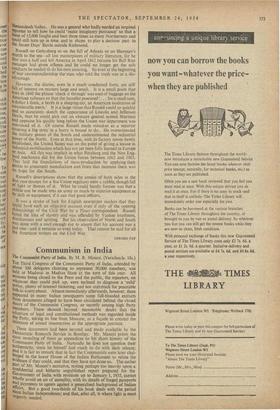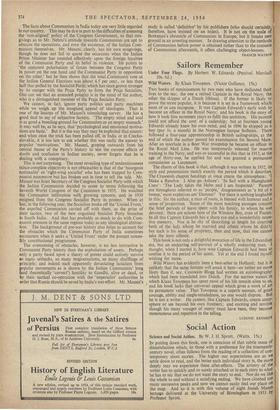Communism in India
The Communist Party of India. By M. R. Masani. (Verschoyle. 18s.)
Titr Third Congress of the Communist Party of India, attended by about 300 delegates claiming to represent 50,000 members, was held at Madurai in Madras State at the turn of this year. All sessions being closed to the Press and the- public, the reporters, on whatever they could pick up, were inclined to diagnose a 'mild' policy, plenty of internal bickering, and not overmuch for peaceable folk to worry about. Almost immediately afterwards, however, there appeared in many Indian newspapers some full-blooded extracts from documents alleged to have been circulated behind the closed doors of the Communist Congress, or secretly among high Party Members. These showed beyond reasonable doubt that the adoption of legal and constitutional methods was regarded inside the Party, taking its line from Moscow, as a façade to conceal the Intention of armed insurrection at the appropriate juncture.
These documents had been secured and made available by the Democratic Research Service in Bombay. Mr. Masani prints the Most. revealing of them as appendices to his short history of the Communist Party of India. Naturally he does not question their authenticity, since he himself had much to do with their release; and it is fair to remark that in fact the Communists were later chal- lenged in the lower House of the Indian Parliament to refute the evidence if they could, and that they have not done,so. The earlier Part of Mr. Masani's narrative, resting perhaps too heavily upon a confidential and hitherto unpublished report prepared for the Government of India with revisions up to January 1, 1935, cannot Wholly avoid an air of unreality, with its details of forged passports and.payments to agents against a generalised background of Indian affairs. But a good two-thirds of his book deals with the period aince Indian Independence; and that, after all, is where light is most urgently needed. The facts about Communism in Tsndia today are very little regarded in our country. This may be dile in part to the difficulties of assessing the 'non-aligned' policy of the Congress Government, so that mis- givings as to Mr. Nehru's attitude towards Communism are apt to obscure the operations, and even the existence, of the Indian Com- munists themselves. Mr. Masani, clearly, has his own misgivings, though he does not fail to quote the occasions when the Indian Prime Minister has rounded effectively upon the foreign loyalties of the Communist Party and its belief in violence. He points to 'the apparent polarisation of forces between the Congress Party in power on the one hand and the Communist Party in opposition on the other,' but he then shows that the total_Cornmunist vote at the Indian General Elections was about 4.5 per cent., or less than half that polled by the Socialist Party, which has since grown stronger by its merger with the Praja Party to form the Praja Socialists. One can see that an amended polarity is in the mind of the author, who is a distinguished member of the Praja Socialist Party.
We cannot, in fact, ignore party politics and party machines while we weigh up the imagined appeal of ideologies. That is one of the lessons of Mr. Masani's stimulating survey. He has a good deal to say of subjective factors. 'The empty mind and soul is as good a breeding-ground for Communism as an empty stomach.' It may well be, as he says, that 'psychological and emotional motiva- tions are basic.' But it is the way they may be exploited that counts: and when once the trick has been pulled off, in India or in Czecho- slovakia, it is too late to ask whether this was really the answer to popular 'motivations.' Mr. Masani, groping outwards from his central theme of the Party's history to test the current effects of doubt and confusion in Indian society, never forgets that he is dealing with a conspiracy.
This is not surprising. The most revealing type of tendentiousness (since complete objectivity is not obtainable) is that of the bourgeois nationalist' or 'right-wing socialist' who has been trapped by Com- munist manoeuvre but has broken out in time to tell the tale. Mr. Masani was Joint Secretary of the Congress Socialist Party with which - the Indian Communists decided to come to terms following the Seventh World Congress of the Comintern in 1935. He watched the Communist infiltration with growing concern, and in 1939 resigned from the Congress Socialist Party in protest. When at last, in the following year, the Socialists broke off the 'United Front,' the expelled Communists carried off with them, as the prize of their tactics, two of the best organised Socialist Party branches in South India. And that has probably as much to do with Com- munist pressure in the same regions today as any ideological abstrac- tion. The background of pre-war history also helps to account for the obstacles which the Communist Party of India sometimes encounters when it seeks a United Front' under the present ostens- ibly constitutional programme.
The overcoming of obstacles, however, is no less instructive in Communist Party history than the exploitation of assets. , Perhaps only a party based upon a theory of power could actively survive so many setbacks, so many tergiversations, so many shufflings of principle; and indeed such apparently devastating isolation from popular movements as is shown by the Indian Communists' long (and theoretically 'correct') hostility to Gandhi, alive or dead, or by their tactical co-operation with the' imperialist' authorities in order that Russia should be saved by.India's war-effort. Mr. Masani's study is called 'definitive' by his publishers (who should certainly, therefore, have insisted on an index). It is not on the scale of Borkcnau's chronicle of Communism in Europe, but it breaks new ground in an arresting manner. In drawing attention to the methods of Communism before power is obtained rather than to the contents of Communism afterwards, it offers challenging object-lessons.
FRANCIS WATSON



































 Previous page
Previous page